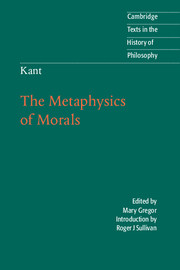Part I - Metaphysical first principles of the doctrine of right
Summary
Preface
The critique of practical reason was to be followed by a system, the metaphysics of morals, which falls into metaphysical first principles of the doctrine of right and metaphysical first principles of the doctrine of virtue. (This is the counterpart of the metaphysical first principles of natural science, already published.) The Introduction that follows presents and, to some degree, makes intuitive the form which the system will take in both these parts.
For the doctrine of right, the first part of the doctrine of morals, there is required a system derived from reason which could be called the metaphysics of right. But since the concept of right is a pure concept that still looks to practice (application to cases that come up in experience), a metaphysical system of right would also have to take account, in its divisions, of the empirical variety of such cases, in order to make its division complete (as is essential in constructing a system of reason). But what is empirical cannot be divided completely, and if this is attempted (at least to approximate to it), empirical concepts cannot be brought into the system as integral parts of it but can be used only as examples in remarks. So the only appropriate title for the first part of The Metaphysics of Morals will be Metaphysical First Principles of the Doctrine of Right; for in the application of these principles to cases the system itself cannot be expected, but only approximation to it. Accordingly, it will be dealt with as in the (earlier) Metaphysical First Principles of Natural Science: namely,
Information
- Type
- Chapter
- Information
- Kant: The Metaphysics of Morals , pp. 1 - 34Publisher: Cambridge University PressPrint publication year: 1996
Accessibility standard: Unknown
- 3
- Cited by
